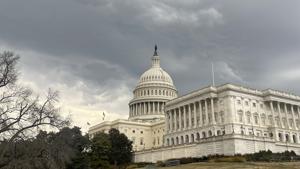
Trump-appointed judge blasts administration for campaign against judiciary
A federal judge dismissed a Justice Department lawsuit against all 15 federal district judges in Maryland Tuesday, emphasizing the extraordinary nature of the case and excoriating the administration for its treatment of the judiciary as a whole.
U.S. District Judge Thomas Cullen of Virginia, appointed by President Donald Trump in 2020, ruled that the administration lacked standing and cited two other “irreconcilable defects” that precluded him from considering the case on its merits.
The administration sued the U.S. District Court of Maryland in June for delaying the deportation of illegal immigrants challenging their deportation by petitioning the court by two business days. The slight delay, its chief judge reasoned, was necessary for the court to ensure it reviewed all such requests before the detainee was moved or deported. However, the U.S. Department of Homeland Security argued that the judge’s standing orders interfered with the administration’s ability to enforce immigration law and “protect public safety and national security.” It contended that because the standing orders engendered “automatic injunction[s] against the federal government,” they were unlawful.
“Fair enough, as far it goes,” wrote Cullen in a 39-page opinion. “If these arguments were made in the proper forum, they might well get some traction.”
The administration could have petitioned the Judicial Council of the Fourth Circuit, which oversees the administration of multiple federal district courts, including Maryland’s, and has “the authority to rescind or modify local court rules.” Or it could have directly appealed the orders to the Fourth Circuit as applied to a particular case, according to Cullen.
Instead, it chose a “different, and more confrontational, path,” wrote Cullen, of suing the court’s 15 judges, its clerk and the court itself.
Cullen ultimately agreed with the defendants, who argued that the dispute was a political dispute between co-equal branches of government and that, since they were acting in their ordinary capacity as judges, they were protected by judicial immunity. Judicial immunity protects judges from being sued unless they are acting outside their judicial capacity or their jurisdiction.
Cullen noted that he wasn’t surprised by the administration’s choice to take a more aggressive approach, and he explained why in a footnote.
“Indeed, over the past several months, principal officers of the Executive (and their spokespersons) have described federal district judges across the country as ‘left-wing,’ ‘liberal,’ ‘activists,’ ‘radical,’ ‘politically minded,’ ‘rogue,’ ‘unhinged,’ ‘outrageous, overzealous and unconstitutional,’ ‘crooked,’ and worse,” Cullen wrote.
“Although some tension between the coordinate branches of government is a hallmark of our constitutional system, this concerted effort by the Executive to smear and impugn individual judges who rule against it is both unprecedented and unfortunate.”
The administration filed an appeal with the U.S. Court of Appeals for the Fourth Circuit late Tuesday afternoon.
Latest News Stories

Congress to face mounting pressure to act on future of D.C.

Trump says appeals court ruling rejecting tariffs ‘highly partisan’

DOJ urges federal judge to strike down climate change law

WATCH: Newsom deploys state police to help local law enforcement

Appeals court rejects Trump’s tariffs, but leaves them in place

Denver Public Schools accused of violating Title IX

Poll: 41% of parents worried about school safety before Minneapolis shooting

Report: Offshore wind critics played role in Revolution Wind work stoppage

Nevada governor addresses statewide cyberattack

Illinois quick hits: Mine manager pleads guilty; Johnson issues food executive order

Op-Ed: Chicago-area transit needs an intervention, not another fix

WATCH: ‘Partisans’ who want to should ‘get up and move’ from Illinois, Pritzker says


